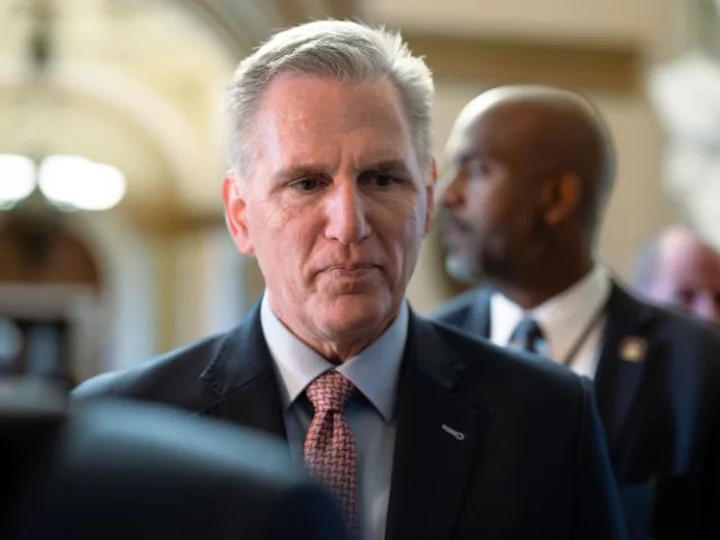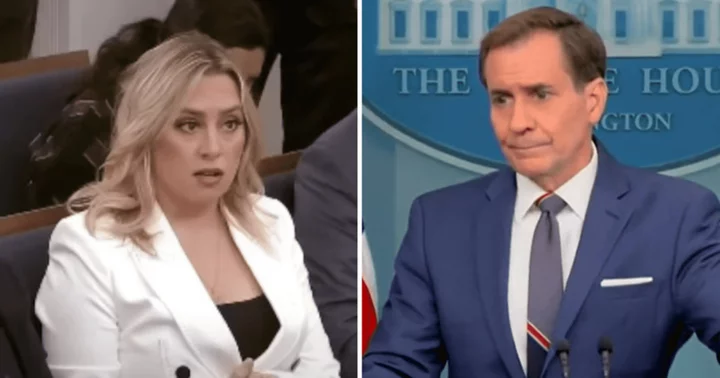With six days until the government runs out of money, House Speaker Kevin McCarthy has a choice to make: Does he risk a shutdown to keep his job or does he cross his Republican hardliners by working with Democrats?
It's a defining moment that has been months in the making. To build favor with his detractors, McCarthy is allowing Republicans to move forward with voting on a series of appropriations bills this week, even though they will be dead on arrival in the Democratic-controlled Senate.
But time is running out and Republicans have failed to rally around a short-term option. And the promises McCarthy made in January when he bowed to hardliners to get his speaker's gavel are finally coming home to roost.
"This is the third major fight of the Congress: opening week, debt ceiling and now government funding," said GOP Rep. Patrick McHenry of North Carolina, one of McCarthy's trusted allies who helped negotiate the bipartisan debt ceiling deal. "This was always going to be a battle."
McCarthy has both publicly and privately tried to compel members of his conference to unite around something -- anything -- to strengthen their leverage in spending talks with the Senate.
He's also made clear that falling into a shutdown won't make Republicans any stronger in the negotiations, but the speaker is still facing a right flank that would rather see a shutdown than work with Democrats. And former President Donald Trump jumped into the fray last week, encouraging Republicans on Truth Social to oppose any spending bill that doesn't defund the Department of Justice or the criminal investigations into him.
"Don't let the D.C. uniparty scare you into thinking that a government shutdown is the end of the world," Republican Rep. Andy Biggs of Arizona wrote on social media. "A so-called shutdown is really a pause in nonessential federal spending."
The calculus for McCarthy has gotten even more complicated since Senate Majority Leader Chuck Schumer took steps to advance his own short-term spending bill, which would likely include disaster aid and additional funding for the war effort in Ukraine, the latter of which hardliners in the House fiercely oppose. If the Senate passes that bill, McCarthy would be confronted with whether to put it on the floor, ignore it or try to amend it -- all of which carries its own risks for the speaker.
"I know Kevin McCarthy and I like Kevin. I'm just -- sooner or later, they're going to have to decide how he's going to be able to lead," said Sen. Joe Manchin, a moderate Democrat from West Virginia.
McCarthy, though, has stopped short of committing to putting a Senate-passed short-term spending bill on the floor, knowing that doing so could mean a call for his ouster.
"We will continue to work with people. I just believe if you aren't funding the troops and you aren't funding the border, it's pretty difficult to think you are going to win in a shutdown. I've been through those a couple of times," McCarthy said Friday.
During a call with the Republican conference Saturday afternoon, McCarthy pushed members to rally around a short-term spending bill that includes funds for border security. That would give House Republicans a position from which to begin negotiations with the Senate.
When asked whether he thought McCarthy should put a Senate-passed stopgap bill on the House floor, GOP Rep. Chip Roy of Texas responded: "I do not think that would be a wise course of action."
A race against the clock as tensions run high
The House will return Tuesday and begin votes on a series of yearlong spending bills to fund the departments of Defense, State, Agriculture and Homeland Security. But each of those bills could still face uncertainty on the House floor. Leadership failed twice to advance the defense bill last week. The agriculture bill also faced headwinds this summer.
"Let me be clear on one thing: Every single day that we wait and we get closer to October 1, that is giving more leverage to the administration. It's taking away leverage from House Republicans," said GOP Rep. Garret Graves of Louisiana.
Members and aides worked through the weekend to try to ensure that any differences were ironed out before the packages hit the floor. But even if Republicans could agree on four spending bills, they'd need to pass another seven -- two of which still haven't passed committee -- before Friday, negotiate with the Senate and get them signed into law before Saturday at midnight.
"Obviously, the timetable is very short," Roy told reporters. "And, you know, getting stuff out of the House and then getting agreement in the Senate and so forth; doesn't seem highly likely,"
Rep. Marc Molinaro of New York, a moderate who helped broker the idea to start moving individual spending bills, acknowledged the plan could still face hurdles. But he hopes that moving more individual bills could bring some of his hardline colleagues on board with a stopgap bill.
McCarthy put the House GOP's stopgap bill on ice amid a right-wing rebellion, but he didn't rule out the idea of eventually bringing it to the floor.
"I'm not here to say I have the utmost confidence," Molinaro said. But "the goal is to try to move as many as possible to show the good-faith effort on both sides to move a broader package. ... The concern (among hardliners) was that it was a head fake, that we were gonna move one appropriation bill but no more."
In the Senate, Schumer is eying a last-ditch effort and is already in talks with Minority Leader Mitch McConnell on a short-term spending option that could give Congress more time to negotiate a full-year spending package.
"We may now have to go first ... given the House," Schumer told CNN's Manu Raju in an interview last week. "Leader McConnell and I are talking and we have a great deal of agreement on many parts of this. It's never easy to get a big bill, a (continuing resolution) bill done, but I am very, very optimistic that McConnell and I can find a way and get a large number of votes, both Democratic and Republican, in the Senate."
Asked whether lawmakers should just enter into bipartisan negotiations now, given the ticking clock, McHenry said: "You start to build out your own votes with your party, if you can. And not until you exhaust that do you look at any other alternatives."
The last-minute scramble could have been avoided if the House and Senate stuck to an agreement in the debt ceiling reached in May between Republicans and the White House that set top-line spending numbers across the federal government. But House Republicans marked their bills up at far lower levels after a rebellion from conservatives. The Senate also added an additional $8 billion for defense and another $5.7 billion for non-defense emergency spending.
A handful of House Republicans from swing districts are also looking at a potential long-shot procedural option, known as a discharge petition, that would go over McCarthy's head to bring a bipartisan funding bill to the floor. But it's a time-consuming maneuver and at this point couldn't avert a shutdown -- it could merely help get lawmakers out of one.
GOP Rep. Mike Lawler, who represents a Biden-won district in New York, said that if Republicans don't pass a short-term funding bill, he'd sign on to the discharge petition.
"If there is not going to be a (continuing resolution) coming out of the House Republican caucus, then I will move forward with a discharge petition." Lawler told CNN.
The leaders of the bipartisan House Problem Solvers Caucus told CNN on Sunday that "all options are on the table" to force a vote on their alternative stopgap plan to avert a shutdown. While the caucus leaders, Reps. Brian Fitzpatrick and Josh Gottheimer, said they hope McCarthy puts the measure on the floor, they said they have spoken with the parliamentarian about other avenues and raised the possibility of using a discharge petition to force a vote.









